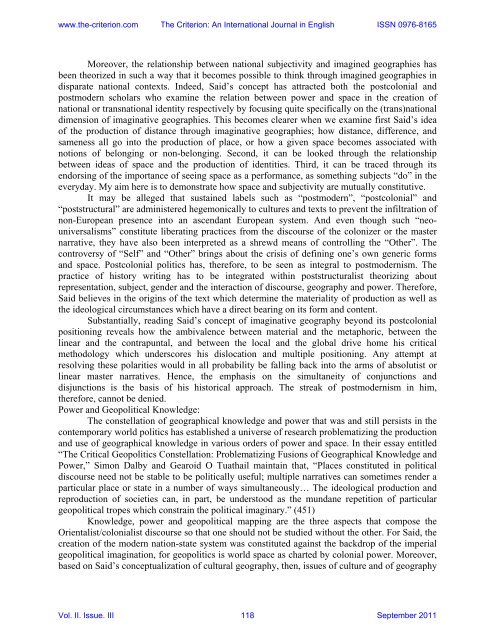Vol. II. Issue. III September 2011 - The Criterion: An International ...
Vol. II. Issue. III September 2011 - The Criterion: An International ...
Vol. II. Issue. III September 2011 - The Criterion: An International ...
Create successful ePaper yourself
Turn your PDF publications into a flip-book with our unique Google optimized e-Paper software.
www.the-criterion.com <strong>The</strong> <strong>Criterion</strong>: <strong>An</strong> <strong>International</strong> Journal in English ISSN 0976-8165<br />
Moreover, the relationship between national subjectivity and imagined geographies has<br />
been theorized in such a way that it becomes possible to think through imagined geographies in<br />
disparate national contexts. Indeed, Said’s concept has attracted both the postcolonial and<br />
postmodern scholars who examine the relation between power and space in the creation of<br />
national or transnational identity respectively by focusing quite specifically on the (trans)national<br />
dimension of imaginative geographies. This becomes clearer when we examine first Said’s idea<br />
of the production of distance through imaginative geographies; how distance, difference, and<br />
sameness all go into the production of place, or how a given space becomes associated with<br />
notions of belonging or non-belonging. Second, it can be looked through the relationship<br />
between ideas of space and the production of identities. Third, it can be traced through its<br />
endorsing of the importance of seeing space as a performance, as something subjects “do” in the<br />
everyday. My aim here is to demonstrate how space and subjectivity are mutually constitutive.<br />
It may be alleged that sustained labels such as “postmodern”, “postcolonial” and<br />
“poststructural” are administered hegemonically to cultures and texts to prevent the infiltration of<br />
non-European presence into an ascendant European system. <strong>An</strong>d even though such “neouniversalisms”<br />
constitute liberating practices from the discourse of the colonizer or the master<br />
narrative, they have also been interpreted as a shrewd means of controlling the “Other”. <strong>The</strong><br />
controversy of “Self” and “Other” brings about the crisis of defining one’s own generic forms<br />
and space. Postcolonial politics has, therefore, to be seen as integral to postmodernism. <strong>The</strong><br />
practice of history writing has to be integrated within poststructuralist theorizing about<br />
representation, subject, gender and the interaction of discourse, geography and power. <strong>The</strong>refore,<br />
Said believes in the origins of the text which determine the materiality of production as well as<br />
the ideological circumstances which have a direct bearing on its form and content.<br />
Substantially, reading Said’s concept of imaginative geography beyond its postcolonial<br />
positioning reveals how the ambivalence between material and the metaphoric, between the<br />
linear and the contrapuntal, and between the local and the global drive home his critical<br />
methodology which underscores his dislocation and multiple positioning. <strong>An</strong>y attempt at<br />
resolving these polarities would in all probability be falling back into the arms of absolutist or<br />
linear master narratives. Hence, the emphasis on the simultaneity of conjunctions and<br />
disjunctions is the basis of his historical approach. <strong>The</strong> streak of postmodernism in him,<br />
therefore, cannot be denied.<br />
Power and Geopolitical Knowledge:<br />
<strong>The</strong> constellation of geographical knowledge and power that was and still persists in the<br />
contemporary world politics has established a universe of research problematizing the production<br />
and use of geographical knowledge in various orders of power and space. In their essay entitled<br />
“<strong>The</strong> Critical Geopolitics Constellation: Problematizing Fusions of Geographical Knowledge and<br />
Power,” Simon Dalby and Gearoid O Tuathail maintain that, “Places constituted in political<br />
discourse need not be stable to be politically useful; multiple narratives can sometimes render a<br />
particular place or state in a number of ways simultaneously… <strong>The</strong> ideological production and<br />
reproduction of societies can, in part, be understood as the mundane repetition of particular<br />
geopolitical tropes which constrain the political imaginary.” (451)<br />
Knowledge, power and geopolitical mapping are the three aspects that compose the<br />
Orientalist/colonialist discourse so that one should not be studied without the other. For Said, the<br />
creation of the modern nation-state system was constituted against the backdrop of the imperial<br />
geopolitical imagination, for geopolitics is world space as charted by colonial power. Moreover,<br />
based on Said’s conceptualization of cultural geography, then, issues of culture and of geography<br />
<strong>Vol</strong>. <strong>II</strong>. <strong>Issue</strong>. <strong>II</strong>I 118 <strong>September</strong> <strong>2011</strong>
















